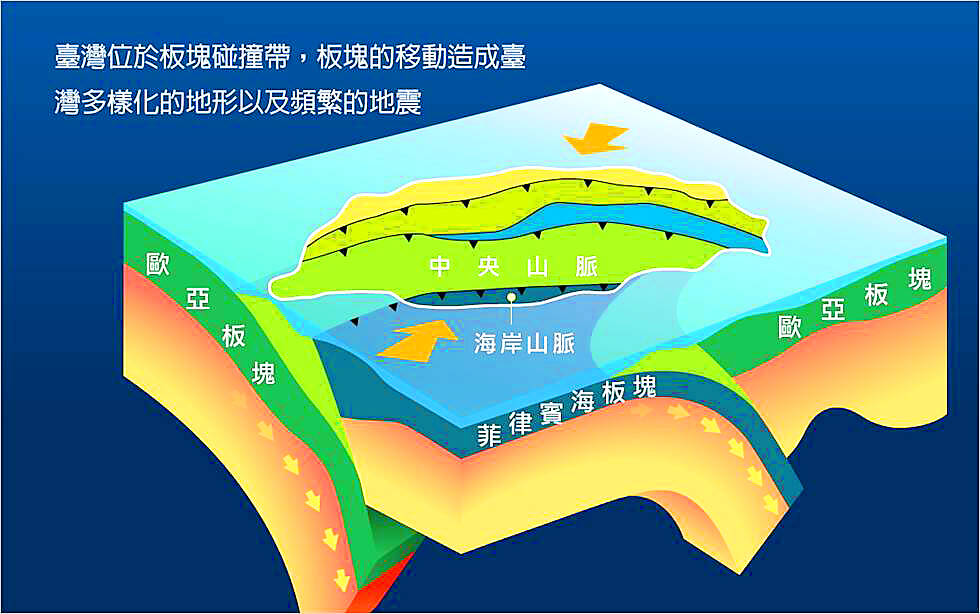There is no indication that Taiwan is physically moving away from China, the Central Weather Bureau said on Wednesday, after people on social media said that GPS data showed Taiwan moving east.
The Earth’s mantle is exerting pressure on the Eurasian Plate, the Philippine Sea Plate and the Pacific Plate, gradually changing the shape of Taiwan proper, bureau Director-General Cheng Ming-dean (鄭明典) said.
However, he said the nation is not moving east from the vantage point of the Eurasian Plate, on which China lies.

Photo courtesy of the Central Weather Bureau
The Pacific Plate and the Philippine Sea Plate subduct into the mantle under the Central Mountain Range, while the Eurasian Plate is moving over the former plates, Cheng said.
GPS data might show a gradual eastward movement of landmarks west of the Central Mountain Range, but this affects the whole Eurasian Plate and does not mean that Taiwan and China are “drifting apart,” he said.
On the contrary, the same forces might in the distant future push Taiwan and China closer together, he said.
The shape of Taiwan proper would also change, with the east coast taking a concave shape and northern Taiwan becoming broader, he added.
Governmental researchers monitor changes in Taiwan’s tectonic position by using data from 450 GPS observation stations, the bureau wrote on Monday.

‘DENIAL DEFENSE’: The US would increase its military presence with uncrewed ships, and submarines, while boosting defense in the Indo-Pacific, a Pete Hegseth memo said The US is reorienting its military strategy to focus primarily on deterring a potential Chinese invasion of Taiwan, a memo signed by US Secretary of Defense Pete Hegseth showed. The memo also called on Taiwan to increase its defense spending. The document, known as the “Interim National Defense Strategic Guidance,” was distributed this month and detailed the national defense plans of US President Donald Trump’s administration, an article in the Washington Post said on Saturday. It outlines how the US can prepare for a potential war with China and defend itself from threats in the “near abroad,” including Greenland and the Panama

A magnitude 4.9 earthquake struck off Tainan at 11:47am today, the Central Weather Administration (CWA) said. The hypocenter was 32.3km northeast of Tainan City Hall at a depth of 7.3km, CWA data showed. The intensity of the quake, which gauges the actual effect of a seismic event, measured 4 in Tainan and Chiayi County on Taiwan's seven-tier intensity scale, the data showed. The quake had an intensity of 3 in Chiayi City and County, and Yunlin County, while it was measured as 2 in Kaohsiung, Nantou County, Changhua County, Taitung County and offshore Penghu County, the data showed. There were no immediate reports of

The Chinese Nationalist Party (KMT) is maintaining close ties with Beijing, the Democratic Progressive Party (DPP) said yesterday, hours after a new round of Chinese military drills in the Taiwan Strait began. Political parties in a democracy have a responsibility to be loyal to the nation and defend its sovereignty, DPP spokesman Justin Wu (吳崢) told a news conference in Taipei. His comments came hours after Beijing announced via Chinese state media that the Chinese People’s Liberation Army’s Eastern Theater Command was holding large-scale drills simulating a multi-pronged attack on Taiwan. Contrary to the KMT’s claims that it is staunchly anti-communist, KMT Deputy

RESPONSE: The government would investigate incidents of Taiwanese entertainers in China promoting CCP propaganda online in contravention of the law, the source said Taiwanese entertainers living in China who are found to have contravened cross-strait regulations or collaborated with the Chinese Communist Party (CCP) could be subject to fines, a source said on Sunday. Several Taiwanese entertainers have posted on the social media platform Sina Weibo saying that Taiwan “must be returned” to China, and sharing news articles from Chinese state media. In response, the Mainland Affairs Council (MAC) has asked the Ministry of Culture to investigate whether the entertainers had contravened any laws, and asked for them to be questioned upon their return to Taiwan, an official familiar with the matter said. To curb repeated